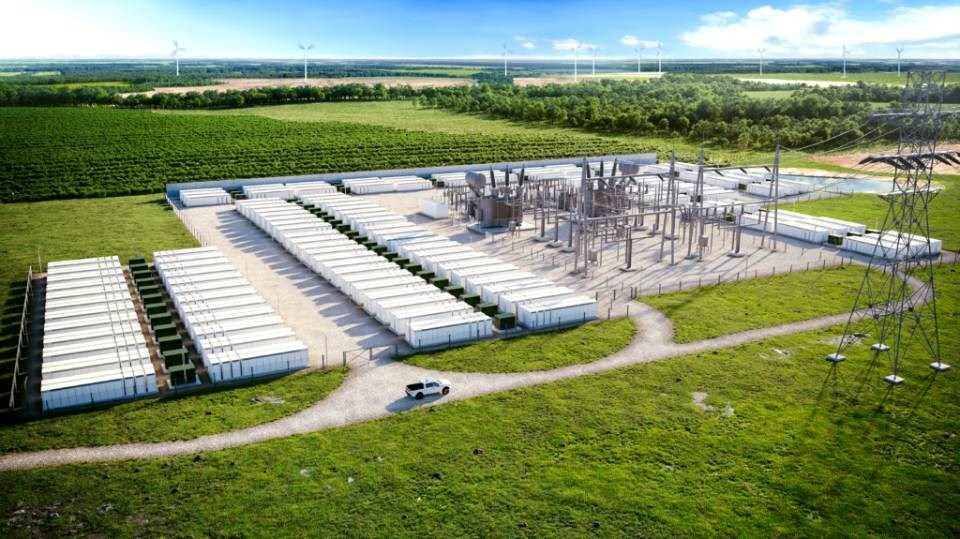Five years ago, when NRStor was building a case for its energy storage project, Jason Rioux knew he wanted to do development differently.
While the province was busy shutting down gas- and oil-burning energy plants, no one was really talking about how to store energy for later use, he said.
But NRStor was convinced large-scale battery storage was the way of the future.
“Little two-megawatt and five-megawatt projects are not going to help the 30,000-megawatt power system that we have in Ontario that will probably turn into a 60,000-megawatt power system in the next couple of decades because of the energy transition we're talking about,” said Rioux, NRStor's chief development officer.
The former director of business development for Ontario Power Generation has been involved with multiple energy development projects over the years, including a flywheel energy storage project and a compressed air storage project with Compass Minerals.
But it's NRSTor's partnership with Six Nations of the Grand River that inspired his recent talk at the BEV In Depth: Mining to Minerals conference held last week in Sudbury.
NRStor wanted to go big on a meaningful project with a partner that would benefit equally from the initiative, Rioux said.
After settling on a southern Ontario property near the former Nanticoke coal-fired power station, which still boasted some of the transmission infrastructure from its 41 years in operation, the company realized the perfect partner was right in front of them.
Six Nations of the Grand River, the largest First Nation by population in Canada, is a community that includes all six Haudenosaunee nations and whose traditional territory is bordered by Brant, Norfolk and Haldimand Counties.
The community has a diverse portfolio of economic development projects, which includes an industrial business park, a convention and events centre, and a cultural centre.
“They’re right there,” Rioux said. "This is their home area, and big projects have happened all around them and they haven't been part of it.”
Want to read more stories about business in the North? Subscribe to our newsletter.
NRStor only had a grain of an idea when it approached Six Nations with a proposal. But Rioux said the company was determined that, if they were going to collaborate, they would do so right from the earliest stages.
“‘We just have an idea, but we want to do it with you,'" Rioux recalled of their approach.
"'We don’t want to come back to you four years later and introduce you to the project after it's all figured out. We want to do it before we figure it out.’”
Together, the partners devised a plan for a 250,000-megawatt battery power storage project that, when complete, will help reduce greenhouse gas emissions by 4.1 million tonnes annually.
It involves the installation of a Tesla Megapack system, a series of battery modules to store energy, help stabilize the provincial power grid, and prevent outages.
The project received final approval from the Independent Electricity System Operator (IESO) in February, along with $50 million in funding from Natural Resources Canada toward its development.
Construction will begin next month, Rioux said, and the facility is expected to be operational in 2025.
NRStor has learned a lot from the collaboration, said Rioux, who firmly believes that impact benefit agreements are "yesterday's business model.”
Through the entire process, NRStor and Six Nations have been 50-50 partners, forming Oneida Energy Storage LP to bring the project forward.
Together, the partners decided to purchase batteries from Tesla, selected Aecon as the construction manager, brought on Northland Power as their equity partner, and invested capital into the project.
On some aspects, such as the technical expertise, NRStor led the way, while in others, particularly community engagement, Six Nations took the lead.
“A partnership for us now — what we've learned on this — is that you start way at the beginning,” Rioux said. “You start with that relationship. You need to build trust; you need to get to know each other.”
He encouraged companies to "be generous” in sharing their knowledge with Indigenous partners, but emphasized that they need to listen, too.
“You have to listen to everything they know, because they know stuff that you don't know,” he said.
“You need to help each other, understand each other's perspectives, help each other in the decision-making that you're making around your projects.”
The Oneida project will be the largest of its kind in North America, although Rioux was quick to point out it might not hold that title for long as the Independent Energy Systems Operator (IESO) begins issuing more requests for proposals for additional large-scale battery storage projects.
It's taken longer than the partners wanted to get to this point, but Rioux is excited to be paving the way for similar initiatives.
Years from now, he predicted, systems operators will marvel at how they ran the power network for so long without storage capability.
And he's proud that the work of NRStor and Six Nations has created a foundation of knowledge and expertise that will guide the province's power systems in its next chapter.
"We learned a lot together, and this project wouldn't have happened without (Six Nations),” Rioux said.




